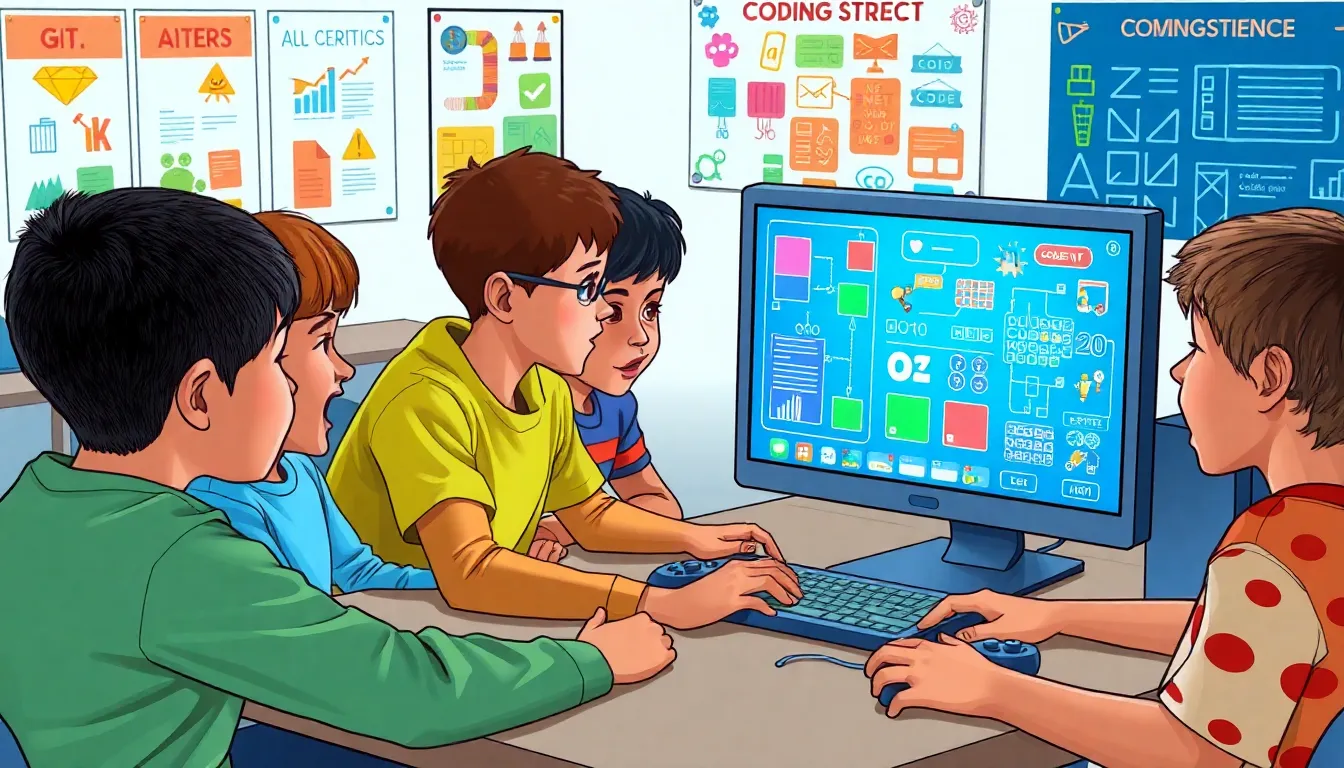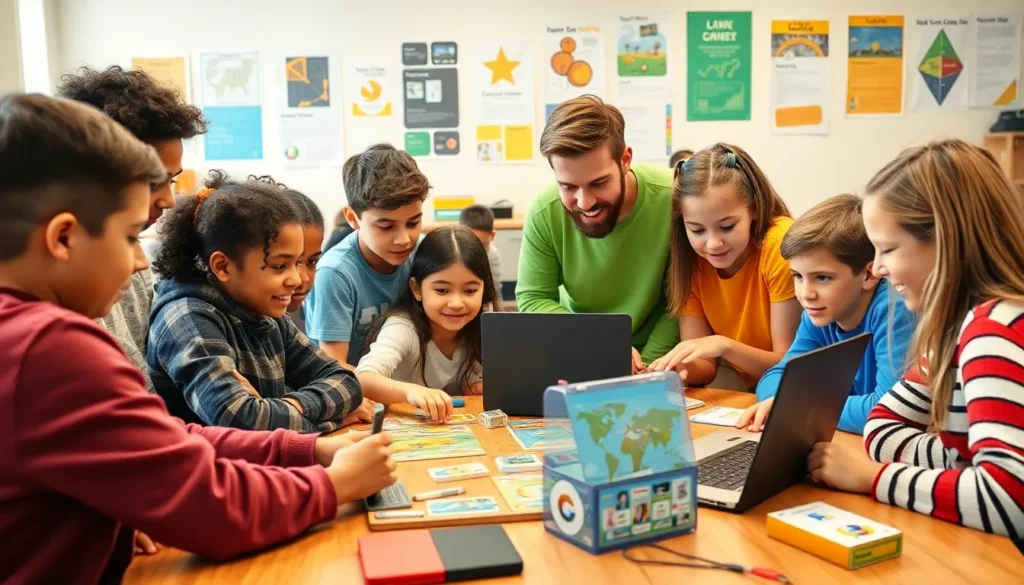In a world where coding can feel like a foreign language, computer science games are the secret sauce that makes learning fun and engaging. Imagine diving into a realm where algorithms are your allies and debugging is just a quirky challenge waiting to be conquered. These games not only sharpen skills but also unleash creativity, transforming the daunting task of coding into an exhilarating adventure.
Computer Science Games
Computer science games play a crucial role in making coding fun and interactive. These games help players grasp complex concepts while enjoying the learning process.
Definition and Purpose
Computer science games are interactive tools designed to teach coding and algorithmic thinking. They incorporate various challenges that require players to apply programming concepts, making learning enjoyable. Through engaging scenarios and puzzles, these games emphasize problem-solving skills. By appealing to different learning styles, they ensure that a wide audience can benefit from coding education. Such games often present coding as a friendly challenge rather than an intimidating task.
Importance in Learning
Learning through computer science games enhances understanding and retention of programming concepts. Engagement levels increase as players embark on coding adventures, which foster creativity and critical thinking. These games offer immediate feedback, enabling learners to understand mistakes and correct them promptly. By promoting collaboration, some games encourage teamwork and communication among players. The user-friendly nature of computer science games lowers barriers to entry for novices, making coding accessible to everyone.
Types of Computer Science Games

Computer science games fall into various categories, each designed to foster different skills and approaches to learning coding and algorithms.
Educational Games
Educational games provide structured learning experiences that teach programming concepts through interactive lessons. Players engage with scenarios that challenge their understanding of coding languages and logic. Numerous platforms offer educational games aimed at children, helping to ignite interest in coding at an early age. As players progress, they encounter increasingly complex challenges that build on prior knowledge, enhancing their learning journey.
Simulation Games
Simulation games replicate real-world scenarios, allowing players to apply coding skills in a practical context. These games often involve managing virtual systems or creating projects that reflect real-life applications of computer science. Players develop an understanding of how code functions in various environments. In these scenarios, failure and iteration become integral parts of the learning process, reinforcing critical thinking and problem-solving abilities.
Puzzle Games
Puzzle games focus on logic and reasoning while presenting players with engaging challenges. These games encourage creative problem-solving as players devise solutions to complex scenarios. With each level, puzzle games escalate in difficulty, pushing players to think critically and adapt their strategies. By adding gamification elements, these types of games maintain high levels of engagement and make coding concepts more accessible and enjoyable.
Benefits of Playing Computer Science Games
Playing computer science games offers numerous advantages, especially in developing essential skills. These games provide an engaging way for players to explore coding concepts while enjoying the process.
Enhancing Problem-Solving Skills
Problem-solving skills improve significantly through computer science games. Players encounter various challenges that require analytical thinking and logical reasoning. Each game presents unique puzzles, promoting flexible thinking and encouraging users to approach problems from multiple angles. As players progress, they learn to deconstruct complex tasks, identify patterns, and develop efficient algorithms. Engaging activities help nurture resilience in facing obstacles, motivating players to explore alternative solutions. Ultimately, these experiences translate into real-world applications, allowing learners to tackle a wide array of challenges beyond gaming.
Encouraging Collaboration
Collaboration thrives in computer science games that promote teamwork. Many titles require players to join forces, sharing knowledge and strategies to achieve common goals. Working together encourages communication skills, trust-building, and mutual problem-solving among participants. Players learn the value of diverse perspectives as they approach challenges collectively. These interactive environments foster a sense of community, where individuals support each other’s growth. Collaborative gaming experiences often lead to lasting friendships and networks, enhancing the overall learning journey and making coding a shared adventure.
Popular Computer Science Games
Computer science games engage learners while developing coding skills. These interactive platforms transform complex concepts into enjoyable challenges.
CodeCombat
CodeCombat immerses players in a coding adventure, enabling them to write actual code to progress through levels. Using JavaScript or Python, users engage in real-time battles and solve puzzles. This game emphasizes algorithmic thinking and teaches players how coding languages function. By completing quests, players enhance their programming skills and experience immediate feedback, allowing for rapid growth and understanding. Teachers often use CodeCombat in classrooms to foster collaborative learning environments where students work together toward common goals.
Scratch
Scratch introduces programming through a visual interface, appealing to younger audiences specifically. Users create animations, interactive stories, and games by dragging and connecting code blocks. Simplifying the coding process, Scratch promotes creativity and logic. With a strong online community, users share projects and receive peer feedback. Educational institutions frequently incorporate Scratch to inspire students and build foundational programming knowledge. This user-friendly platform encourages experimentation and supports various learning styles, making coding accessible to all.
LightBot
LightBot challenges players to solve puzzles using programming concepts through fun gameplay. Designed to teach recursive programming and logic, it requires players to guide a robot through a maze. Progressing through levels enhances critical thinking and problem-solving skills. LightBot provides instant feedback, reinforcing the importance of debugging and algorithm creation. This game serves as an excellent resource for educators seeking to introduce coding fundamentals in an engaging manner, ensuring that players grasp essential concepts while enjoying their experience.
Conclusion
Computer science games are revolutionizing how people approach coding. By transforming the learning process into an engaging adventure these games make coding accessible to everyone. They not only foster problem-solving and critical thinking but also encourage creativity and collaboration among players.

With various types of games available there’s something for every learner. Whether it’s educational games that introduce programming concepts or puzzle games that challenge logical reasoning these interactive tools are paving the way for a new generation of coders. The benefits extend beyond just learning to code; they create a community where players can connect and grow together.
As technology continues to evolve the importance of computer science games in education will only increase. Embracing these tools can lead to a more skilled and innovative workforce ready to tackle the challenges of tomorrow.

